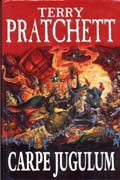 Carpe
Jugulum
Carpe
Jugulum
Terry Pratchett
A book review by Mark L. Olson
Doubleday, 1998, 286 pp, £16.99
The 23rd (honest!) Discworld novel is one of the best. Like all the best Discworld books, it combines Pratchett's humor, mixed-up mythology, and some serious issues.
Vampires from the near-by country of Uberwald have invaded Lancre, and Granny Weatherwax and Nanny Ogg have to set it right. The vampires are powerful - the leader, Count Magpyr is a modernist who has concluded that vampires' aversion to garlic, sunlight, holy symbols and the like is more in the nature of a built-in neuroses, and consequently can be countered. This makes him very powerful and very dangerous. (Particularly to his family, since he's got a bunch of flash cards with every religious symbol in the Discworld which he shows them at random intervals to build up their resistance to holy symbols.)
His modern turn of mind shows in his utilitarian point of view. He looks to milk (not the right, word, actually...) the people of his domain as completely as he can killing them. Being successful at that, he next looks towards controlling neighboring countries like Lancre. Think of it as taking a good, old-fashioned, horror and modernizing it and making it efficient.
Other characters include a well-meaning priest of Om, the Pictsies (blue people who are 6" tall and talk in an impenetrable Scots highland brogue), and a cast of lesser vampires, including Count Magpyr's two teen-aged children Vlad and Lacrimosa (who prefer to be called by names like Terrance and Sally to annoy their parents).
Like any good fairytale there is a moral dimension, foremost in this book is Granny Weatherwax fighting the temptation to give in and become a very powerful vampire out of sheer moral fiber and an inclination to make her own choices, thank you very much. Also, the priest of Om -- who starts out as a very modern sort of very well educated priest who doesn't believe in much of anything -- winds up realizing that a religion with good and evil (and good, singable songs) is what actually interests people. And, as before, Granny's lectures on not treating people like they were things.
The best Discworld novels are all fairytales in the very best sense, and this is one of the better ones.
See also my other Pratchett reviews: The Truth, Terry Pratchett: Guilty of Literature, Carpe Jugulum, The Science of Discworld, The Fifth Elephant, The Amazing Maurice and His Educated Rodents, The Last Hero, Jingo, Night Watch, The Wee Free Men
